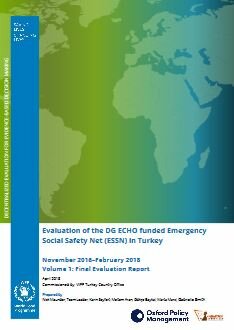
The evaluation was commissioned to inform changes in programme design and delivery for year two and beyond of the ESSN, and was intended for both accountability and learning purposes. It focused on assessing the relevance, effectiveness, efficiency, connectedness and sustainability of the ESSN. Overarching evaluation questions focussed on: the extent to which the ESSN meets the needs of refugees and if its objectives are coherent with national policies and donor strategies; the appropriateness of the single platform approach; the effectiveness of the targeting and coverage performance; the main cost drivers and the proportion of total funding which reached beneficiaries; the alignment of the ESSN with the Turkish refugee response as a whole; and the future prospects of the programme.
The evaluation covered the following activities: a) cash transfer; b) capacity-building; c) coordination; and d) monitoring and evaluation.
Key evaluation findings included:
- The ESSN provided relevant and appropriate assistance in a highly innovative format;
- The ESSN was relevant to the needs of refugees, but was not designed to accommodate the specific needs of particular vulnerable groups;
- The ESSN was aligned with national policies and capitalised on national institutions, but remained a separate programme;
- The partnership arrangements established were generally appropriate to implement the ESSN, but links to protection services were limited;
- The ESSN has significantly increased coverage of refugees, compared to preceding cash assistance, but targeting the most vulnerable has been challenging.
Key recommendations from the evaluation included:
- WFP Türkiye should support other agencies to develop complementary livelihood and employment programmes;
- WFP Türkiye and WFP Rome should improve cost efficiency and budget equity;
- WFP Türkiye should encourage all partners to minimize application barriers for specific vulnerable groups;
- WFP Türkiye should develop and implement a technical assistance strategy in partnership with partners to handover accountability functions to Turkish institutions.



